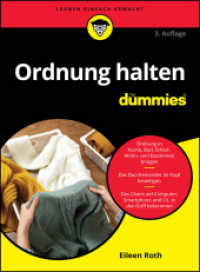Full Description
Strengthen every mentor's capacity to provide constructive, meaningful support to entry-level teachers! Designed around James B. Rowley's highly successful guide Becoming a High-Performance Mentor, this comprehensive multimedia presentation offers staff developers the materials they need to help experienced and novice mentor-teachers acquire the six essential behaviors of high-performance mentors: committing, accepting, communicating, coaching, learning, and inspiring. Workshop facilitators will be able to introduce the author's high-performance mentoring framework and engage participants in discussions about:The four stages of the mentoring relationship Understanding beginning teachers and related learning levels Methods to increase mentor/mentee commitment The influence of beliefs on the mentoring process Mentoring as a path to professional growth The multimedia kit for Becoming a High-Performance Mentor provides a mentor-teacher beliefs inventory and mentoring scenarios and includes: The companion book, Becoming a High-Performance Mentor, which details the author's proven approach for developing outstanding mentor-teachers A 47-minute, content-rich VHS video that features James B. Rowley discussing the essentials of high-performance mentoring and shows mentors demonstrating practical mentoring strategies A companion DVD with navigation menu for easy stop-and-search control of the video content A step-by-step facilitator's guide that connects the core content of the book to the video/DVD and includes segment prompts, workshop outlines, extended workshop activities, key points, and discussion questionsThis all-in-one package is indispensable for mentor program coordinators, trainers, staff developers, and principals who want to broaden and strengthen the knowledge, skills, and values of their mentor-teachers.
Contents
About the AuthorIntroductionHow to Use This GuideHow to Use the Video/DVDAdditional Resources for FacilitatorsChapter-by-Chapter Study Guide: Becoming a High-Performance Mentor: A Guide to Reflection and Action1. IntroductionSummaryDiscussion QuestionsWorkshop ActivitiesPractical Applications2. MentoringSummaryDiscussion QuestionsWorkshop ActivitiesPractical Applications3. CommittingSummaryDiscussion QuestionsWorkshop ActivitiesPractical Applications4. AcceptingSummaryDiscussion QuestionsWorkshop ActivitiesPractical Applications5. CommunicatingSummaryDiscussion QuestionsWorkshop ActivitiesPractical Applications6. CoachingSummaryDiscussion QuestionsWorkshop ActivitiesPractical Applications7. LearningSummaryDiscussion QuestionsWorkshop ActivitiesPractical Applications8. InspiringSummaryDiscussion QuestionsWorkshop ActivitiesPractical ApplicationsHandoutsHandout 1: Qualities of the High-Performance Mentor TeacherHandout 2: Developmental Mentoring ScenariosHandout 3: Personal Learning Reflections GuideHandout 4: Exploring Cognitive Apprenticeship StrategiesOverheadsOverhead A: The High Performance Mentoring FrameworkOverhead B: Four Stages of the Mentoring RelationshipOverhead C: Reflective ResponsesOverhead D: Commitment, Dialogue, and InfluenceOverhead E: Causes of Low Mentor/Beginning Teacher CommitmentOverhead F: Five Perspectives for Understanding Beginning TeachersOverhead G: Five Frameworks for Thinking About Beginning TeachersOverhead H: The Developmental Mentoring ContinuumOverhead I: Indicators of Commitment and Abstract ThinkingOverhead J: Coaching FrameworksOverhead K: Beginning Teacher Learning LevelsOverhead L: Six Cognitive Apprenticeship StrategiesOverhead M: Teacher Learning: Methods and FociOverhead N: Force Field AnalysisOverhead O: Albert Schweitzer QuotationSample Workshop AgendasHalf-Day Workshop AgendaOne-Day Workshop AgendaTwo-Day Workshop AgendaWorkshop Evaluation Form








